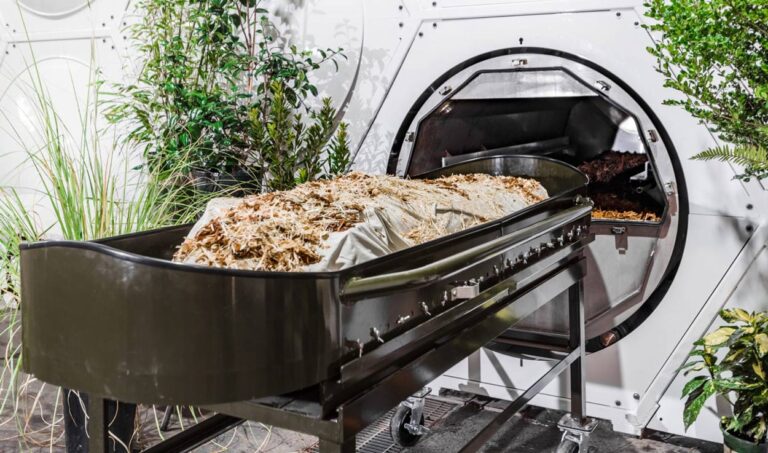California legalises ‘human composting’ burial method to fight climate change
Apart from traditional burials and cremations, California has now approved a third alternative to return the deceased back to Earth. On Sunday 18 September 2022, governor Gavin Newsom signed Assembly Bill 351 into law which will allow residents to choose human composting—also known as natural organic reduction (NOR)—after death, starting in 2027.
Human composting, which is already legalised in Washington, Colorado, Oregon, and Vermont, involves placing the body in an eight feet-long reusable stainless steel vessel filled with biodegradable materials like wood chips, alfalfa, and straw. After 30 to 60 days, the remains will fully decompose into nutrient-rich soil—which can then be returned to loved ones or donated to land conservation.
The bill, drafted by assembly member Cristina Garcia, essentially allows for the organic reduction of human remains and is considered as a more eco-friendly alternative to traditional burial methods.
“AB 351 will provide an additional option for California residents that is more environmentally-friendly and gives them another choice for burial,” Garcia said in a press release. “With climate change and sea-level rise as very real threats to our environment, this is an alternative method of final disposition that won’t contribute emissions into our atmosphere.”

According to National Geographic, a single cremation process produces an estimated 534.6 pounds of carbon dioxide (CO2). Given this figure, cremations in the US alone emit approximately 360,000 metric tons of CO2 every year. Burials, on the other hand, can leach toxic chemicals into the ground. On these terms, the result of human composting is “a completely safe and economical method of final disposition that offers additional choice for people to direct their final wishes,” the press release stated.
“For each individual who chooses NOR over conventional burial or cremation, the process saves the equivalent of one metric ton of carbon from entering the environment,” it continued.
Despite being the fifth US state to approve human composting, the process continues to raise ethical questions. As noted by SFGATE, Colorado’s version of the law states that the resultant soil of multiple people cannot be combined without consent, be sold or be used to grow food for human consumption. While the California bill bans the combining of multiple peoples’ remains, unless they are family, it does not explicitly restrict the sale of the soil or indeed its use to grow food.
The California Catholic Church hence believes that human composting “reduces the human body to simply a disposable commodity.”
“NOR uses essentially the same process as a home gardening composting system,” executive director Kathleen Domingo told SFGATE, adding that the process was developed for livestock, not humans. “These methods of disposal were used to lessen the possibility of disease being transmitted by the dead carcass. Using these same methods for the ‘transformation’ of human remains can create an unfortunate spiritual, emotional and psychological distancing from the deceased.”
The church also emphasised that human composting, which may lead to the soil being dispersed in public locations, “risks people treading over human remains without their knowledge while repeated dispersions in the same area are tantamount to a mass grave.”
Meanwhile, Garcia admitted that she herself may choose this method when she passes away. “I look forward to continuing my legacy to fight for clean air by using my reduced remains to plant a tree,” the assembly member stated.






